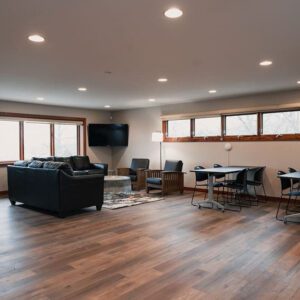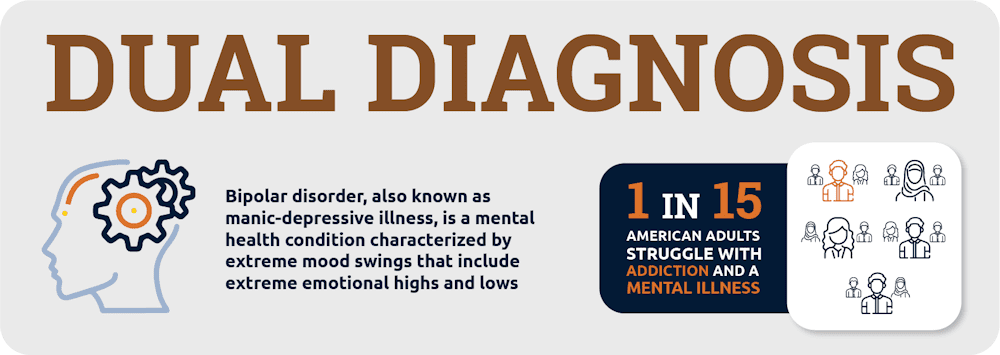Bipolar Treatment Centers in Illinois


Two of the risks that are associated with bipolar disorder are suicide and substance abuse or addiction. Therefore, if you have been diagnosed with this mental illness you should seek professional help. Northern Illinois Recovery Center can help treat co-occurring disorders through our dual diagnosis treatment program in Illinois and get you on the path to recovery with our Northern IL bipolar treatment programs.
Jump to Section
Inpatient Bipolar Treatment at Northern Illinois Recovery Center


In our inpatient bipolar treatment program, clients receive round-the-clock care in a supportive and structured environment. This allows us to monitor our clients closely, providing immediate responses to any arising needs.
Our inpatient treatment program offers a range of therapies designed to address the root causes of addiction and manage the symptoms of bipolar disorder. These include cognitive-behavioral therapy (CBT), dialectical behavior therapy (DBT), and other scientifically-backed therapeutic interventions.
Please note that while we strive to provide comprehensive care for our clients, it’s important to reach out to us directly for the most accurate information on our inpatient bipolar disorder treatment program. We’re here to answer any questions you may have and guide you on your path to recovery.
Outpatient Treatment for Bipolar Disorder
At Northern Illinois Recovery Center, we believe in the power of personalized treatment. We understand that addiction and mental health disorders like bipolar disorder can’t be treated with a one-size-fits-all approach. Instead, we offer individualized outpatient treatment programs designed to meet the unique needs of each person who walks through our doors.
Our outpatient program for bipolar disorder provides the flexibility and freedom you need to continue living your life while receiving the necessary treatment for bipolar disorder and addiction. This means you can maintain your work, family, or school commitments while still prioritizing your recovery.
What is Bipolar Disorder?


There are several types of bipolar disorder:
- Bipolar I Disorder
- Bipolar II Disorder
- Cyclothymic Disorder (Cyclothymia)
The exact cause is unknown, but it is believed to be a combination of genetic, environmental, and neurological factors. Treatment typically includes a combination of medication and psychotherapy to help manage symptoms and prevent relapse. With appropriate treatment and support, many people suffering from these mental health issues can lead fulfilling and productive lives.


What are the Common Symptoms of Bipolar Disorder?
Common symptoms include:
- Elevated mood, extreme optimism, or irritability
- Increased energy and activity levels
- Decreased need for sleep
- Racing thoughts and rapid speech
- Impulsivity and poor decision-making
- Grandiose beliefs or delusions
- Increased focus on goal-directed activities
- Restlessness or agitation
- Persistent feelings of sadness, hopelessness, or emptiness
- Loss of interest or pleasure in activities once enjoyed
- Fatigue or loss of energy
- Difficulty concentrating or making decisions
- Changes in appetite and weight
- Sleep disturbances (insomnia or oversleeping)
- Feelings of guilt or worthlessness
- Physical symptoms, such as headaches or body aches
- Suicidal thoughts or behaviors
It’s important to note that the severity and duration of these symptoms can vary greatly depending on the individual and the type of bipolar disorder they have.
What are the Different Types of Bipolar Disorder?
There are several types of bipolar disorder, and each can have a unique relationship with drugs or alcohol:
This type involves at least one manic episode, which may be preceded or followed by a hypomanic or major depressive episode. People with bipolar I disorder may use substances to self-medicate during manic or depressive episodes, leading to addiction. Substance abuse can also trigger or worsen manic episodes.
Characterized by at least one major depressive episode and at least one hypomanic episode, but no full-blown manic episodes. Individuals with bipolar II disorder may turn to substances to alleviate depressive emotions or to enhance hypomanic states. This can result in a cycle of substance abuse and worsening mental health symptoms.
This milder form of bipolar disorder involves periods of hypomania and mild depression that last for at least two years (one year in children and adolescents). Substance abuse may occur as an attempt to manage fluctuating moods or to cope with the chronic nature of cyclothymia. NIR offers depression therapy in Illinois that works in conjunction with individualized programs.
Co-occurrence of bipolar disorder and addiction is common, as individuals may use substances to self-medicate and cope with their moods and emotions. However, substance abuse often exacerbates bipolar symptoms and can lead to more severe episodes, increased risk of suicide, and poorer treatment outcomes. It is crucial for individuals with co-occurring bipolar disorder and addiction to receive integrated treatment that addresses both conditions simultaneously.
What Causes Bipolar Disorder to Develop?


- Genetic factors: Bipolar disorder tends to run in families, suggesting that there is a genetic component to the illness. Research has shown that individuals with a close relative, such as a parent or sibling, who has bipolar disorder are at a higher risk of developing the condition themselves. However, no single gene has been identified as the cause; instead, multiple genes likely contribute to the development of the disorder.
- Environmental factors: Various life events and external factors can play a role in triggering bipolar disorder in susceptible individuals. These may include significant life stressors, such as the loss of a loved one, a traumatic event, or major life changes. Additionally, substance abuse can contribute to the onset or worsening of bipolar symptoms.
- Neurological factors: Imbalances in brain chemicals called neurotransmitters, such as dopamine, serotonin, and norepinephrine, are thought to play a role in the development of bipolar disorder. Abnormalities in brain structure and function have also been observed in individuals with bipolar disorder, although more research is needed to understand the exact relationship between these abnormalities and the condition.
- Hormonal imbalances: Some studies suggest that hormonal imbalances may contribute to the development of bipolar disorder, although further research is needed to establish a clear link.
It is important to note that the development of bipolar disorder is likely due to a combination of these factors, and the specific causes may vary from person to person. Early intervention, appropriate treatment, and ongoing support can help manage symptoms and improve the quality of life for individuals living with bipolar disorder.
Treating Bipolar Disorder and Addiction


Through dual diagnosis treatment, we can help you see the connection between your bipolar disorder symptoms and your addiction. For instance, when you are feeling extremely high or low, you may turn to alcohol. Your high may be a euphoria that gives you a false sense of confidence. Your low may be a form of depression. In either case, you may turn to alcohol to cope with how you are feeling.
Likewise, when you take drugs or alcohol, you could exacerbate your mental health concerns even worse. Alcohol or drugs can magnify your depression, anxiety, or euphoria. It can also make your mood swings even more severe. The bottom line is that alcohol or drugs will not make your mental health concerns better, it will only make it worse. You will need to find a bipolar disorder treatment center that is also an Illinois alcohol rehab to help treat both conditions
Treating co-occurring bipolar disorder and addiction requires an integrated approach that addresses both conditions simultaneously. This typically involves a combination of medicine, therapy, and programs at a bipolar disorder treatment center that is tailored to the individual’s needs.
Bipolar Disorder Medications
Medications play a vital role in stabilizing mood and managing symptoms of this mental health disorder. Some common medications used include:
- Mood stabilizers: Lithium, valproic acid, lamotrigine, and carbamazepine are often prescribed to regulate moods and prevent episodes of mania and depression.
- Antipsychotics: Atypical antipsychotics, such as quetiapine, olanzapine, or aripiprazole, may be used to manage manic or mixed episodes.
- Antidepressants: In some cases, antidepressant medications, often in combination with a mood stabilizer, may be prescribed to treat depressive episodes.
- Anti-anxiety medications: Benzodiazepines or other anti-anxiety drugs can help manage anxiety but should be used cautiously due to their potential for abuse.
In opiate treatment centers, medications like methadone, buprenorphine, or naltrexone may be used to manage withdrawals and reduce cravings in cases of opioid addiction. Similarly, medications like disulfiram, naltrexone, or acamprosate may be prescribed for alcohol addiction.
Various forms of psychotherapy can be beneficial for individuals with bipolar disorder and addiction. Some common therapeutic approaches include:
- Cognitive Behavioral Therapy (CBT): CBT focuses on identifying and changing negative thought patterns and behaviors. It can help individuals develop healthier coping strategies and improve their overall functioning.
- Dialectical Behavior Therapy (DBT): DBT is a specialized form of CBT that emphasizes mindfulness, emotion regulation, distress tolerance, and interpersonal effectiveness. It can be particularly helpful for individuals who struggle with impulsivity and self-destructive behaviors.
- Family-focused therapy: This approach involves working with the individual’s family members to improve communication, problem-solving, and emotional support, which can be crucial for recovery from both bipolar disorder and addiction.
- Group therapy: Participating in group therapy or support groups can provide individuals with a sense of community, shared experiences, and peer support, which can be beneficial for long-term recovery.
An effective treatment that addresses both bipolar disorder and addiction is essential for successful recovery. Dual diagnosis treatment centers are specialized facilities that offer integrated care for individuals with co-occurring mental health and substance use disorders. They provide a combination of medical, psychological, and addiction treatment services tailored to the individual’s needs.
- Inpatient rehab: In more severe cases, inpatient treatment may be necessary to provide a structured and supportive environment for detoxification and stabilization. Inpatient programs typically offer a range of therapeutic interventions, including medication management, therapy, and support groups.
- Outpatient programs: For individuals who do not require inpatient care, outpatient programs offer ongoing support and treatment while allowing them to continue living at home. These programs may include group therapy, individual therapy, medication management, and relapse prevention education.
Treating both disorders can be challenging, but with appropriate support and a comprehensive treatment plan, many individuals can achieve lasting recovery and improved quality of life.
Our Bipolar Disorder Treatment Center


- Residential Addiction Treatment
- Partial hospitalization program
- Intensive outpatient program
- Trauma therapy program
- Drug and alcohol detox center
- Individual therapy program
- Prescription drug addiction rehab
At our bipolar disorder treatment center in Northern IL, you’ll schedule a consultation with one of our mental health professionals and we can assess your needs based on your symptoms and your specific addiction. Our assessment can help you decide the best way to treat bipolar disorder.
Start Your Treatment for Bipolar Disorder Today
You do not have to battle your addiction and your mental health condition on your own. You get the treatment and support you need at Northern Illinois Recovery Center. Our trained specialists are here to help you with every aspect of your recovery through every stage of treatment.
To find out more about our bipolar disorder treatment programs, call us today. You can meet with a licensed specialist and get started with your treatment.
Get the help you need at Northern Illinois Recovery!
855.458.1739
Northern Illinois Recovery Resources


Licensed Physician and Surgeon
Dr. Beth Dunlap, a board-certified addiction medicine and family medicine physician, and is the medical director at Northern Illinois Recovery Center. She is responsible for overseeing all the integrated medical services at both campuses. Beth completed medical school, residency, and fellowship at Northwestern University, where she continues to serve on the faculty as a member of the Department of Family and Community Medicine. She has extensive experience in addiction medicine at all levels of care, and her clinical interests include integrated primary care and addiction medicine, harm reduction, and medication-assisted treatment.



